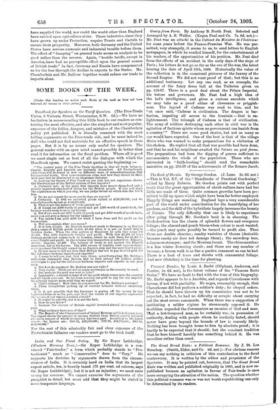SOME BOOKS OF THE WEEK.
[Under this heading we notice such Books of a. week as have not been reserved for review in other forms.] Handbook for Speakers on. the Tariff Question. (The Free-Trade Union, 8 Victoria Street, Westminster, S.W. 6d.)—We have no hesitation in recommending this little book to our readers as con- taining the most effective, and also the simplest and most popular, exposure of the follies, dangers, and mistakes of the Chamberlain policy yet published. It is literally crammed with the most telling arguments on the Free-trade side, and he must indeed be dull who could not find materials for an effective speech in these pages. But it is by no means only useful for speakers. The general reader with an open mind cannot possibly do better than read it for information on the fiscal problem. Where all is good we must single out as best of all the dialogue with which the Handbook opens. We cannot resist quoting the beginning :— " The central point of the Free Trade doctrine is that all trade being ex- change, Exports and Imports are mutually dependent. All Protectionist objections will be found to rest on different ways of misunderstanding this fundamental truth. How misconceptions arise and how they should be dealt with may best be illustrated in an imaginary dialogue.
Q. Leaving the theory of Free Trade on one side, has not experience shown the disadvantage of the British system of free imports ?
A. Certainly not ; in the main free imports have meant cheap food and a greatly improved standard of living for the British people. If you will state the experience on which you rely, we can judge better on which side the truth lies.
Q. Do we not import far more goods than we export?
A. Certainly. In 1902 we imported goods valued at £520,000,000, and we exported goods valued at £349,000,000.
Then is not the balance of trade against us ?
A. If Isend out esoo worth of goods and get £500 worth of goods back, the balance would seem to be in my favour.
Q. But if you send out 2300 worth of goods and get 2500 worth of goods back, must you not give a cheque for the balance ?
A. Yes, unless I am paid =0 for work I have done and for profit on the transaction.
Q. Will you explain what you mean
A. It is very simple. An English merchant sends to Germany in an English ship a cargo of British goods worth £1,000 when it is put on board ship in London docks. When the ship arrives at Hamburg he Sells this cargo for E1,200. The £200 represents freight and profit. With this 21,200 he buys German goods and comes back to London, where he sells them for .21,400 to cover freight and profit. In the returns this transaction is entered as Exports, £1,000; imports, £1,400. The balance of trade is not against the English merchant, but in his favour. The 2400 excess of imports over exports repre- sents payment for freight earned by an English ship and the merchant's profit. Q. Do you mean to tell me then that Britain has not to pay in solid gold for the difference between imports and exports ? A. I mean to tell you just that very thing, notwithstanding Mr. Seddon's ridiculous statement that Britain had to send abroad 160 million golden sovereigns to pay for the difference between imports and exports in one year on,y. Q. But how do you know Mr. Seddon was not right ? A. Very easily. There are not as many sovereigns in the country to send. Q. But perhaps the gold was sent in bars ? A. Impossible ; a record is kept of all the gold which comes into the country and all which goes out. So far from sending out gold to pay for our imports we actually import more gold than we export.
Q. That's strange! How then do you account for Mr. Seddon's mistake ?
A. From thoughtless picking up of current fallacies without examining them. Q. Is it not possible that the foreigner is paying off the money he has borrowed from us in the past, and that the excess of our imports represents the return of our capital invented abroad ? A. It might be possible, but it is not the fact.
Q. How do you know ?
A. Because the amount of British capital invested abroad increases every year.
Q. What evidence have you of that ?
A. The Report of the Commissioners of Inland Revenue published every year. The report shows the amount of income derived from British capital invested abroad in respect of which income-tax has bean paid. According to the latest report, the figures are : 1681-82, £30,600,000; 1891-92, £54,700,000; 1901-02, £62,600,000."
For the rest of this admirably fair and clear exposure of the Protectionist fallacies our readers must go to the book itself.






















































 Previous page
Previous page